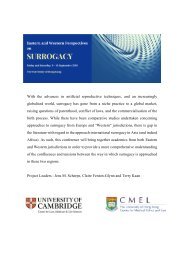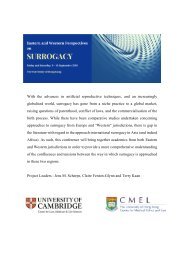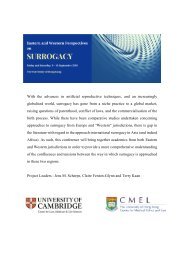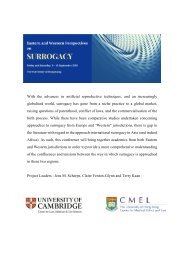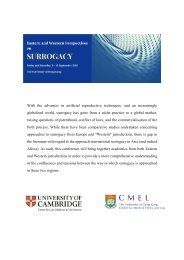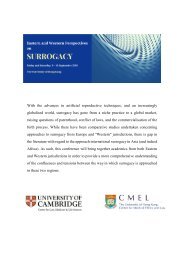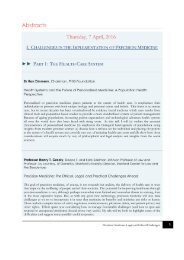PM conference programme_2016.04.05_concise_Clean(Latest)
Create successful ePaper yourself
Turn your PDF publications into a flip-book with our unique Google optimized e-Paper software.
Dr Jeffrey M. Skopek, Lecturer in Medical Law, Ethics, and Policy, Faculty of Law, University of<br />
Cambridge; Deputy Director, Centre for Law, Medicine and Life Sciences<br />
Personalized Rationing: The Law and Ethics of Differentiation<br />
Some of the greatest challenges that we will face in implementing precision medicine will arise from the ways in<br />
which increased precision destabilizes foundational categories and concepts in our law and ethics. This can be seen<br />
in the pharmacogenomic stratification of patient populations, which will give rise to new and difficult questions<br />
about the conditions in which an individual patient should be able to differentiate himself from a group of similar<br />
patients in order to gain access to a treatment that is not available to the group—and conversely, the conditions in<br />
which a patient should be able to resist being differentiated from a group in order to avoid losing access to a<br />
treatment. In this presentation, I will identify and analyze some previously unrecognized challenges concerning the<br />
law and ethics of differentiation in this area. In doing so, I will highlight the fact that advances precision medicine<br />
will both benefit and harm patients, moving us closer not only to personalized treatment, but also to personalized<br />
rationing.<br />
Professor Ock-Joo Kim, Professor and Chair in the Department of Medical History and Medical<br />
Humanities, Seoul National University College of Medicine<br />
Dr Yoon-Jung Chang, Associate Professor of Department of Cancer Control and Policy, Graduate<br />
School of Cancer Science and Policy, National Cancer Center; Associate scientist, Hospice &<br />
Palliative Care Branch, National Cancer Center; Expert secretory, Team of legislation, ethics &<br />
policy, Precision Medicine Working Group, Ministry of Health & Welfare, South Korea<br />
Precision Medicine Ethics: Prospects on Clinical Application and Ethical Issues<br />
Precision medicine is one of the programs that follow-up human genome project, in the hope of developing clinical<br />
applications from the personalized genome information. Individual patient's sequence data in comparison with the<br />
database from a larger population is expected to identify specific variations that contribute to personalized<br />
treatment. This effort depends on the availability of biobanks for general population and for particular disease<br />
groups, such as cancer, for which genomic variations exert large enough influence on the prognosis. Various<br />
treatment regimens must be developed unique to the patterns of variations. Ethical and legal issues also need to be<br />
resolved toward these developments. In South Korea, discussion on the possibility of personalized medicine<br />
became active since 2010, including forums and grants supported by Ministry of Health. Korea has several strengths<br />
in the infrastructure toward the development of precision medicine. Korea Center for Disease Control has<br />
established large biobanks for population-based cohorts and patient cohorts. Korean National Health Insurance<br />
Service maintains health care data for all Koreans that can be used for research. There is a strong infrastructure for<br />
clinical trials including cancer treatment. Capacity for developing new drugs and diagnostic technologies has also<br />
significantly increased. This paper overviews the prospects on precision medicine in Korean contexts, particularly<br />
focusing on ethical and legal issues.<br />
PRECISION MEDICINE: LEGAL AND ETHICAL CHALLENGES 4



